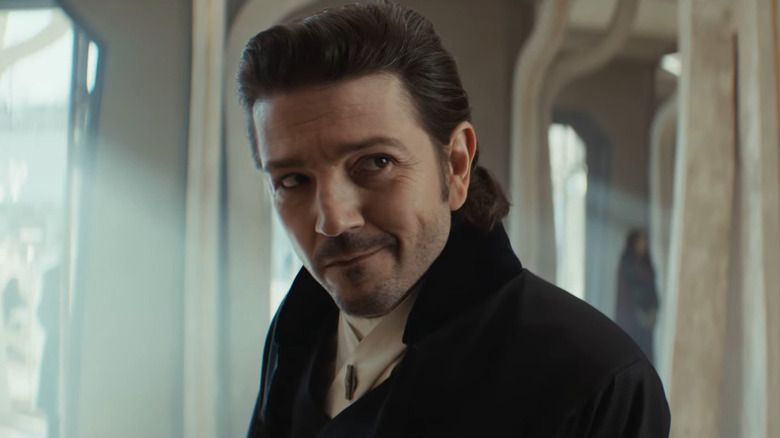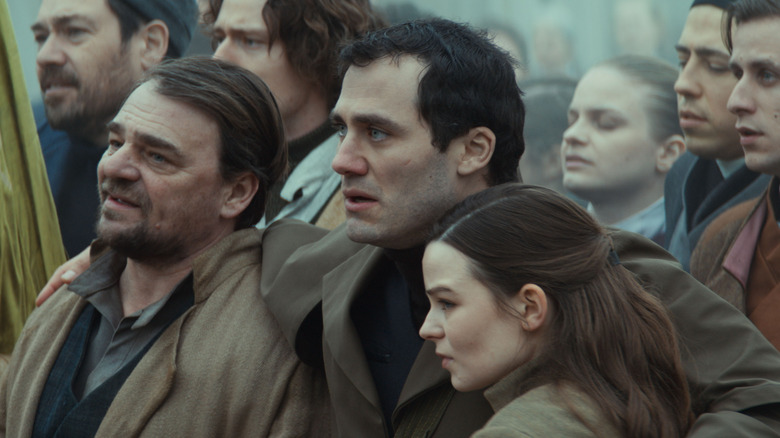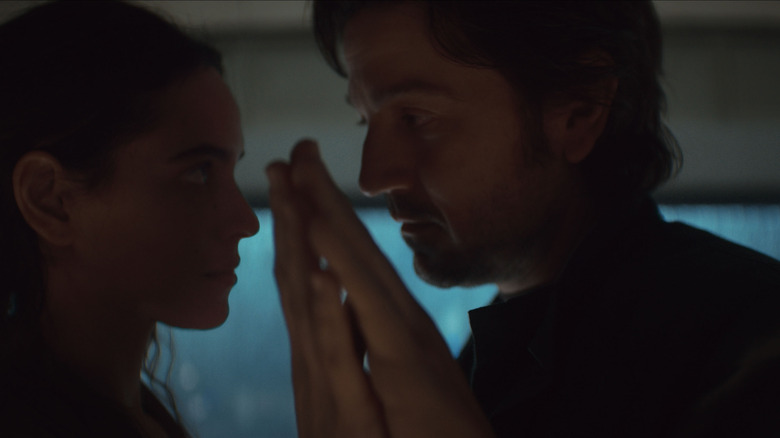Andor's Creator Had One Condition For The Star Wars Show's Writers
"Andor" is the single greatest thing to happen to "Star Wars" since George Lucas let other people write and direct "The Empire Strikes Back." It is not only a meticulously written show, with an incredible cast, some of the best dialogue in television in the past decade, and genuinely stunning production design that looks as expensive as it was, but it is simply unlike anything else in the franchise.
Now, this last bit has been the source of some contention amongst fans. Some consider the tonal, visual, and narrative departure from the rest of the franchise in "Andor" to be a bad thing; that because "Andor" doesn't feel like "Star Wars," it damages the rest of the franchise and it should have just lost the "Star Wars" moniker. Except, as our own Jeremy Mathai so eloquently put it, the actual biggest strength of "Andor" is that "it represents the purest distillation of George Lucas' core ethos yet," and it is the show that best understands "Star Wars." This is the "Star Wars" title that most explicitly captures George Lucas' allegory for the Vietnamese resistance against the U.S. empire of the original trilogy, features the franchise's first use of the word "genocide," and is a show that is all about the reality of fighting an oppressive empire.
Much like Christopher Nolan's unfamiliarity with comic books allowed him to approach his Batman trilogy from an outsider's perspective and deliver a stunning piece of superhero filmmaking, Tony Gilroy's outsider's perspective and refusal to be chained to canon and the larger franchise is the secret sauce of "Andor." Indeed, it was even his biggest condition for his writers.
Not changing because it's Star Wars
Speaking with The Hollywood Reporter after the release of "Andor" season 1, Gilroy talked about the variety of people who worked on every department of the show, and how they'd change their behavior and attitude because they were working on a "Star Wars" project. "And you go, 'Wait, no. Do your thing. You're here because we want you to be real.' So it's a testament to the potent power of 'Star Wars.' It really gets into people's heads, but to change the lane and do it this way, it takes a little effort."
This is what separates "Andor" from other "Star Wars" show: not that it tries to separate itself from the franchise, but that it doesn't try to force the "Star Wars" aesthetic on itself. In that same interview, Gilroy talked about hiring his creative team, and how — starting with his production designer — he painted a picture of how the show would be different. "We put a marker down. It was kind of a test for Disney: 'How serious are you?' We didn't want to go with any of the traditional 'Star Wars' people," Gilroy said. "We wanted [production designer] Luke Hull, who was like 12 years old and had just done 'Chernobyl.' He's just a fricking genius, but non-'Star Wars' in every way."
Recently, Gilroy appeared on The Late Show with Stephen Colbert and said, "You don't have to know anything about 'Star Wars' to watch our show." That is the key. There is a big difference between making a "Star Wars" show explicitly made for people who don't like "Star Wars" and making a show that — as Gilroy says in that interview — simply tries to be a great TV show on its own without relying on what came before.
Andor wouldn't be what it is without Star Wars
It's easy to think that, because of how tonally different "Andor" is from the rest of "Star Wars," it doesn't need to be a part of the franchise. But to do so ignores why "Andor" is so praised. It's not that the show doesn't feel like "Star Wars," but the fact that it can do everything it does within the confines of the galaxy far, far away. It's the fact that it turns the Empire into a real, recognizable horror, and tells such a human story inside an alien world that is also home to space wizards with laser swords.
The beauty of "Andor" isn't that it's not like "Star Wars," but that it showed what the franchise could be. This is a show that proved "Star Wars" can be more than just fun adventures, endless cameos, and Force users. (Even when "The Mandalorian" tried to stay away from the Force and the Jedi, it inevitably brought in CG Luke Skywalker.) That is why having "Skeleton Crew" come out right before season 2 of "Andor" was such a breath of fresh air. Both shows could not be more different from one another, yet they paint a picture of a galaxy that is home to all sorts of stories of different tones, flavors, and genres. "Star Wars" doesn't have to be one thing, and with "Andor" finished, it shouldn't just return to being about just the Jedi and lightsabers.


